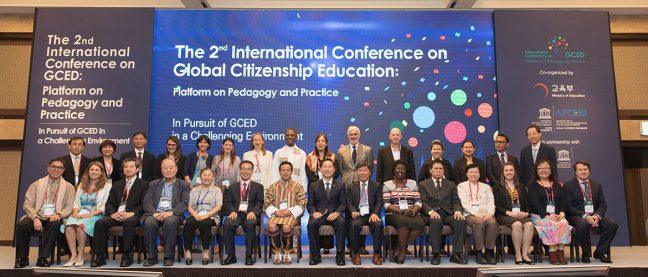In 1953, a survey was undertaken of teachers in New York into their willingness to teach on controversial issues – issues that included whether or not China should have a seat at the UN.
The survey found some teachers were afraid. Afraid of losing control in their classrooms, afraid of being pegged as ‘controversial’ and trouble making, afraid of the reactions of parents or not knowing enough to navigate conversations. Fast forward to today, and many teachers are still daunted by the idea of teaching controversial issues to students. This is why Oxfam Australia is helping teachers across the globe prepare their students to discuss controversial issues, including around poverty and inequality.
On 14 September 2017, Oxfam’s Schools Program Coordinator Annalise De Mel was invited to facilitate a participatory interactive workshop on ‘Teaching Controversial Issues’ at the 2nd International Global Citizenship Education Conference in Seoul, South Korea. Held by the UNESCO Asia-Pacific Centre of Education for International Understanding (APCEIU), the conference aims to empower teachers and learners to mainstream Global Citizenship Education (GCED) in cross-curricula ways to create a more inclusive, just and peaceful world.
The 90-minute workshop was based on Oxfam’s Education Guide for ‘Teaching Controversial Issues’, which is currently being updated. More than 90 people participated in the interactive workshop, including school teachers and principals, academics, education ministry staff and UNESCO staff from around the world.
The workshop explores barriers to teaching controversial issues and the importance of teachers overcoming them, how Oxfam’s Curriculum for Global Citizenship is interlinked, before looking deeper into approaches for teaching controversial issues.
“What opportunities are we losing every day in our classrooms and education spaces around the world by shying away from controversial issues?,” Annalise asked conference attendees.
“Knowledge and skills divorced from real world situations, issues and contexts leave young people unprepared for the complexities of the world outside their classrooms. Therefore, by giving young people the tools to handle controversial issues, you are supporting and developing them as global citizens.”
During the interactive workshop, participants experienced two activities that demonstrated how approaching controversial issues can be done with students from all ages – from junior primary school to senior secondary.
There are several reasons why teachers should overcome their qualms about teaching controversial issues:
- School curriculums require controversial issues to be taught
- Students are exposed to, and hungrier for, more information about the world than ever before
- Discussing controversial issues can help students develop critical thinking skills
- But most importantly, controversial issues affect students’ lives.
As Annalise explained in her workshop: “In our increasingly globally connected and diverse classrooms, students may at times feel marginalised in your classrooms – whether it be because of where they or their family are from, gender, sexual orientation, religion. To ignore controversial issues is to ignore the realities of many of their lives.”
Key to discussing controversial issues is creating a safe space in the classroom, selecting targeted activities that allow for exploration of issues in age appropriate ways, and the role teachers play in facilitating discussion.
“It’s not about the traditional top-down transmission of information,” Annalise said. “It’s about fostering a safe community within your students where they feel heard and understood.”
UNESCO and Oxfam share a firm belief that GCED is critical to changing minds, systems and lives, in order to tackle poverty and inequality. Oxfam’s Schools Program resources are based on an educational framework of GCED pedagogy and methodologies.
Contact Us Today
If you, your teaching staff or organisation are interested in participating in Oxfam Australia’s ‘Teaching Controversial Issues’ workshop, or would like to receive the updated edition of the guide, please contact the Schools Program.
CONTACT US

